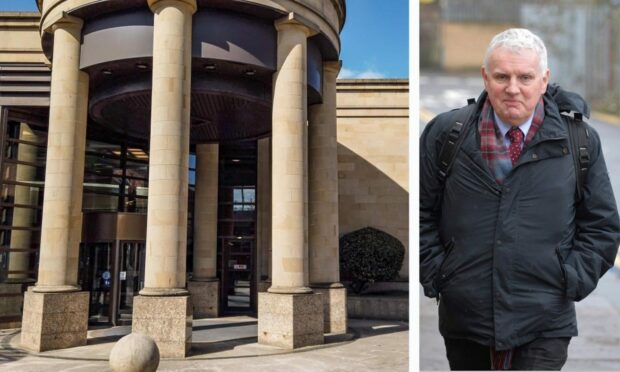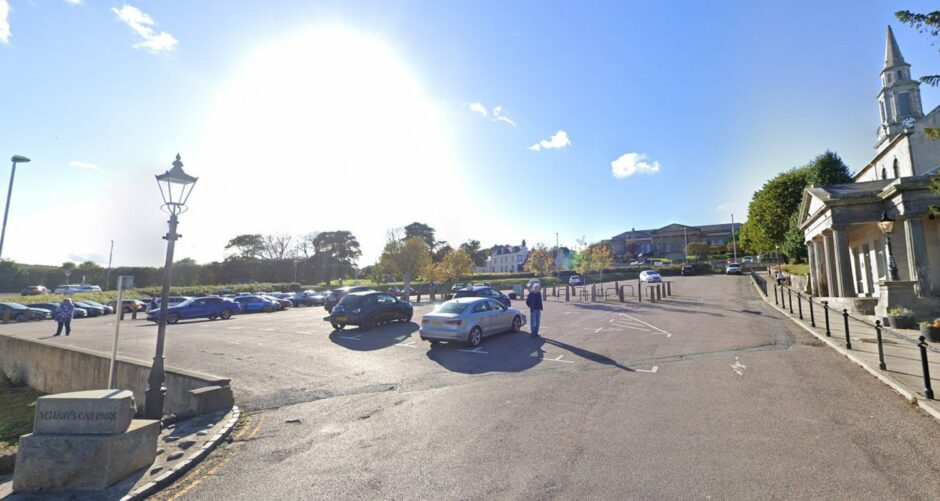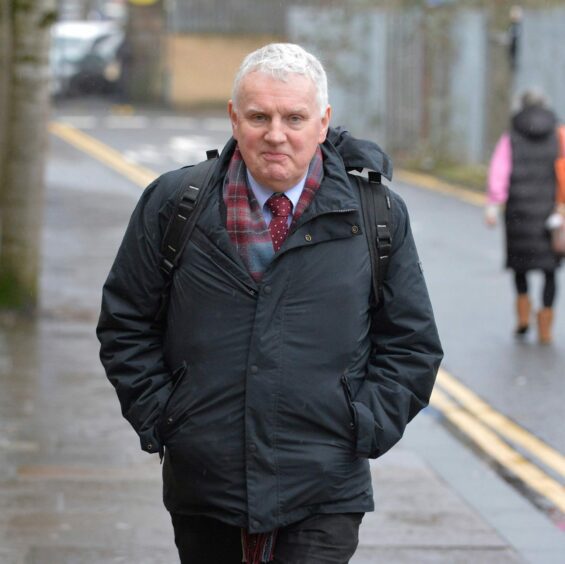An “annoyed” and “bemused” Aberdeenshire sheriff was filmed as a man sat on top of him during a “citizen’s arrest”, a court has been told.
Robert McDonald, 67, had got out of his car to start work at Banff Sheriff Court when he was allegedly confronted by Philip Mitchell.
Sheriff McDonald recalled being “wrestled” to the ground by the 60-year-old, who claimed he was “corrupt”.
Jurors watched what appeared to be mobile phone footage of the incident which occurred on the morning of June 29 2021.
Sheriff McDonald told the court that he was “annoyed” and “bemused” by what happened, having previously ruled in Mitchell’s favour in a civil case.
Alleged assault and abduction
Mitchell, along with 70-year-old William Curtis, are charged with the assault and abduction of the sheriff in St Mary’s car park in Banff.
Curtis alone is further accused of making threatening remarks to First Minister Nicola Sturgeon and former MSP Stewart Stevenson in 2019.
Both of the accused have lodged not-guilty pleas.
Sheriff McDonald, who has presided in Banff for almost five years, gave evidence at the High Court in Glasgow on Thursday.
He recalled getting out of his vehicle when “three gentlemen appeared”.
The sheriff told the trial of the two men that he believed one of the three people was Curtis and then went on to recognise the voice of Mitchell.
Sheriff McDonald had previously ruled on a dispute that Mitchell had been having with the DVLA.
Mitchell allegedly stated in the car park: “You are Sheriff Robert McDonald and I am here to make a citizen’s arrest”.
‘Mr Mitchell was astride me’
Giving evidence, the sheriff told jurors: “He blocked my way and, at some point, laid a hand on me.
“I think he grabbed my upper arm. I certainly could not get past him. He said he was detaining or arresting me and I said, ‘Indeed you are not’.
“I tried to break free but Mr Mitchell wrestled me to the ground and then sat on top of me.
“I was flat on my back and Mr Mitchell was astride me. He was literally sitting across my waist.”
The sheriff said Mitchell accused him of running a “corrupt or kangaroo court”.
Sheriff McDonald went on: “I was taken aback. In the civil case, I had found in Mr Mitchell’s favour as I had granted an appeal.
“It made no sense to me. I was annoyed but totally bemused at what was going on.”
As Mitchell sat on top of the sheriff, the court heard that he phoned the police, urging them to come and arrest the sheriff.
Sheriff McDonald recalled the man he believed to be Curtis “hovering” nearby and he was also aware that what was happening was being filmed.
He said the others appeared to be “encouraging” Mitchell.
The sheriff believed it was “reasonable to assume” they had been waiting for him to arrive at the car park.
Mobile phone video footage
Prosecutor Chris McKenna played the mobile phone video footage to jurors.
In it, Mitchell can be seen confronting the sheriff in the car park before he ends up on the ground.
Various things are said to him as he is being restrained.
While on the ground, Sheriff McDonald managed to attract the attention of a solicitor to get help.
The incident only came to an end after several minutes when police arrived on the scene.
While examining the video evidence, Mr McKenna asked the sheriff: “Who is that lying on the ground?”
Sheriff McDonald replied: “That is me”.
Mr McKenna queried: “Who is on top?”
And the witness responded: “Mr Mitchell”.
‘What I did, I was compelled to do’
Mitchell, who has no defence lawyer, is representing himself at the trial.
He questioned Sheriff McDonald and started by claiming he had “no animosity” towards him.
Mitchell said: “What I did, I was compelled to do. The DVLA had unlawfully revoked my licence.”
Despite having ruled in Mitchell’s favour in the dispute, he again accused the sheriff of presiding over a “kangaroo court”.
Mitchell later put to the witness: “I declared from the outset that I was making a citizen’s arrest and identified myself.”
Sheriff McDonald replied: “You had no basis whatsoever for making a citizen’s arrest in my view.
“I said that you were assaulting me because you had no grounds to do that.”
The trial, before judge Lord Weir, continues.


